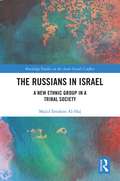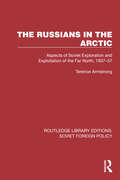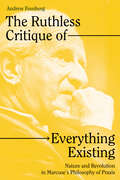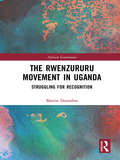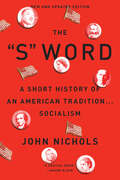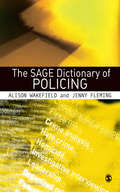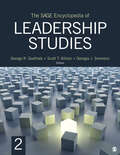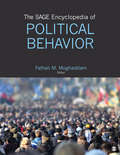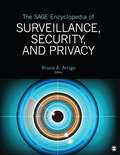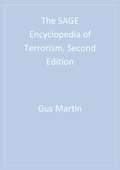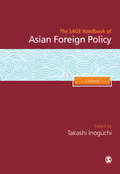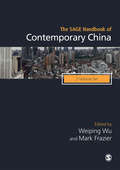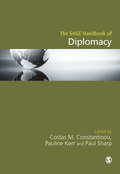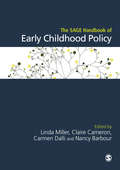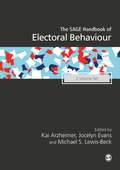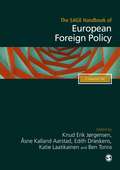- Table View
- List View
The Russians in Israel: A New Ethnic Group in a Tribal Society (Routledge Studies on the Arab-Israeli Conflict)
by Majid Ibrahim Al-HajThis book constitutes the first systematic and critical discussion of questions of immigration and society in Israel from a global perspective. The comprehensive study covers the 30-year period since the beginning of the immigrant influx from the former Soviet Union in the 1990s and incorporates data based on a variety of quantitative and qualitative research methods. It provides an important opportunity to examine identity and patterns of adaptation among immigrants, with the added perspective afforded by the passage of time. Moreover, it sheds light on the Russians' cumulative influence on Israeli society and on the Israel-Palestinian conflict. Considering all groups within Israeli society, it covers Palestinian-Arab citizens in Israel who have almost never been included in analyses addressing questions of Jewish immigration to Israel. Multiculturalism is the central theoretical framework of this study, alongside specific theoretical considerations of ethnic formation, political mobilization among ethnic groups, and immigration and conflict in deeply divided societies. However, while Jewish-Arab relations in Israel are typically analyzed in the context of majority-minority relations, this book offers a pioneering approach that analyzes these relations within the context of a Jewish majority with a minority phobia and an Arab minority with a sense of regional majority. Addressing existing and anticipated influences of Russian immigrants on politics, culture and social structures in Israel, as well as the Israeli-Palestinian conflict, The Russians in Israel will be useful to students and scholars of Middle Eastern politics and society, as well as Israel, Russian, and Ethnicity Studies.
The Russians in the Arctic: Aspects of Soviet Exploration and Exploitation of the Far North, 1937–57 (Routledge Library Editions: Soviet Foreign Policy #12)
by Terence ArmstrongThe Russians in the Arctic (1958) examines Soviet attitudes towards the Arctic, its exploration and opening for exploitation, and the impact of Soviet rule and policies on the peoples native to the vast Siberian wilderness.
The Ruthless Critique of Everything Existing: Nature and Revolution in Marcuse’s Philosophy of Praxis
by Andrew FeenbergHow Marcuse helps us understand the ecological crisis of the 21st centuryFor several years after 1968, Herbert Marcuse was one of the most famous philosophers in the world. He became the face of Frankfurt School Critical Theory for a generation in turmoil. His fame rested on two remarkable books, Eros and Civilization and One-Dimensional Man. These two books represent the utopian hopes and dystopian fears of the time.In the 1960s and 70s, young people seeking a theoretical basis for their revolution found it in his work. Marcuse not only supported their struggles against imperialism and race and gender discrimination, he foresaw the far-reaching implications of the destruction of the natural environment. Marcuse&’s Marxism was influenced by Husserl and Heidegger, Hegel and Freud.These eclectic sources grounded an original critique of advanced capitalism focused on the social construction of subjectivity and technology. Marcuse contrasted the &“one-dimensionality&” of conformist experience with the &“new sensibility&” of the New Left. The movement challenged a society that &“delivered the goods&” but devastated the planet with its destructive science and technology.A socialist revolution would fail if it did not transform these instruments into means of liberation, both of nature and human beings. This aspiration is alive today in the radical struggle over climate change. Marcuse offers theoretical resources for understanding that struggle.
The Rwenzururu Movement in Uganda: Struggling for Recognition (African Governance)
by Martin DoornbosThis book provides a comprehensive account and analysis of the Rwenzururu movement in Western Uganda. The movement began in the 1960s in the Rwenzori region of Toro District, and was a protest by the minority Bakonzo and Baamba ethnic groups against their continued discrimination and incorporation in the Batoro-dominated kingdom-district. In the course of the years this movement experienced various significant transformations, and in the end came to demand recognition of Rwenzururu’s claimed semi-traditional kingship within Uganda. Martin Doornbos illuminates how the Rwenzururu came to life. He documents and analyses the transformations that the movement has undergone, and shows how the Ugandan government responded to, and eventually accepted, the movement while igniting continuing enmity and violence in the process.
The S Word: A Short History of an American Tradition...Socialism
by John NicholsA few months before the 2010 midterms, Newt Gingrich described the socialist infiltration of American government and media as "even more disturbing than the threats from foreign terrorists." John Nichols offers an unapologetic retort to the return of red-baiting in American political life--arguing that socialism has a long, proud, American history. Tom Paine was enamored of early socialists, Horace Greeley employed Karl Marx as a correspondent, and Helen Keller was an avowed socialist. The "S" Word gives Americans back a crucial aspect of their past and makes a forthright case for socialist ideas today.
The SAGE Dictionary of Policing
by Jenny Fleming Dr Alison WakefieldThe SAGE Dictionary of Policing is the definitive reference tool for students, academics and practitioners in police studies. The Dictionary delivers a complete guide to policing in a comprehensive, easy-to-use format. Contributions by 110 of the world's leading academics and practitioners based in 14 countries map out all the key concepts and topics in the field. Each entry includes: " a concise definition " distinctive features of the concept " a critical evaluation " associated concepts, directing readers to linked entries " key readings, enabling readers to take their knowledge further. In addition, The SAGE Dictionary of Policing offers online resources, including free access to key articles and links to useful websites. This is a must-have for students, lecturers, researchers and professionals in police studies, criminology and criminal justice. It is the ideal companion to the SAGE Dictionary of Criminology: together the two books provide the most authoritative and comprehensive guide available. Alison Wakefield is Senior Lecturer in Criminology at the University of New South Wales. She was previously based at City University, London. Jenny Fleming is Professor at the Tasmanian Institute of Law Enforcement Studies, University of Tasmania.
The SAGE Encyclopedia of Leadership Studies
by George R. Goethals Georgia J. Sorenson Scott Townsend AllisonLeadership Studies is a multi-disciplinary academic exploration of the various aspects of how people get along, and how together they get things done. The fields that contribute to leadership studies include history, political science, psychology, anthropology, sociology, philosophy, literature, and behavioral economics. Leadership Studies is also about the ethical dimensions of human behavior. The discipline considers what leadership has been in the past (the historical view), what leadership actually looks like in the present (principally from the perspectives of the behavioral sciences and political science), and what leadership should be (the ethical perspective). The SAGE Encyclopedia of Leadership Studies will present both key concepts and research illuminating leadership and many of the most important events in human history that reveal the nuances of leadership, good and bad. Entries will include topics such as power, charisma, identity, persuasion, personality, social intelligence, gender, justice, unconscious conceptions of leadership, leader-follower relationships, and moral transformation.
The SAGE Encyclopedia of Leadership Studies
by George R. Goethals Georgia J. Sorenson Scott Townsend AllisonLeadership Studies is a multi-disciplinary academic exploration of the various aspects of how people get along, and how together they get things done. The fields that contribute to leadership studies include history, political science, psychology, anthropology, sociology, philosophy, literature, and behavioral economics. Leadership Studies is also about the ethical dimensions of human behavior. The discipline considers what leadership has been in the past (the historical view), what leadership actually looks like in the present (principally from the perspectives of the behavioral sciences and political science), and what leadership should be (the ethical perspective). The SAGE Encyclopedia of Leadership Studies will present both key concepts and research illuminating leadership and many of the most important events in human history that reveal the nuances of leadership, good and bad. Entries will include topics such as power, charisma, identity, persuasion, personality, social intelligence, gender, justice, unconscious conceptions of leadership, leader-follower relationships, and moral transformation.
The SAGE Encyclopedia of Political Behavior
by Fathali M. MoghaddamThe SAGE Encyclopedia of Political Behavior explores the intersection of psychology, political science, sociology, communications, and human behavior to better understand why and how people interact with political processes. Bringing together scholars from around the world, the encyclopedia integrates theories, research, and case studies from a variety of disciplines to help readers better understand the complexities of political behavior. Contributors analyze the forces that shape the behavior of individuals, groups, and social movements and how that behavior impacts political outcomes and public policy debates. In over 360 entries, the encyclopedia focuses broadly on the following topics: Cognitive processes Group identities and influence Individual political behavior International/comparative perspectives Justice and political behavior Media, discourse, and communications Policies and political behavior Political systems Security and terrorism Social political movements Theories of political behavior Voting behavior and political campaigns Aimed at college and university students, this one-of-a-kind reference covers voting patterns, interactions between groups, what makes different types of government systems appealing to different societies, and the impact of early childhood development on political beliefs, among others. Topics explored by political psychologists are of great interest in fields beyond either psychology or political science, with implications, for instance, within business and management. This title will be available online on SAGE Knowledge, the ultimate social sciences library.
The SAGE Encyclopedia of Political Behavior
by Fathali M. MoghaddamThe SAGE Encyclopedia of Political Behavior explores the intersection of psychology, political science, sociology, communications, and human behavior to better understand why and how people interact with political processes. Bringing together scholars from around the world, the encyclopedia integrates theories, research, and case studies from a variety of disciplines to help readers better understand the complexities of political behavior. Contributors analyze the forces that shape the behavior of individuals, groups, and social movements and how that behavior impacts political outcomes and public policy debates. In over 360 entries, the encyclopedia focuses broadly on the following topics: Cognitive processes Group identities and influence Individual political behavior International/comparative perspectives Justice and political behavior Media, discourse, and communications Policies and political behavior Political systems Security and terrorism Social political movements Theories of political behavior Voting behavior and political campaigns Aimed at college and university students, this one-of-a-kind reference covers voting patterns, interactions between groups, what makes different types of government systems appealing to different societies, and the impact of early childhood development on political beliefs, among others. Topics explored by political psychologists are of great interest in fields beyond either psychology or political science, with implications, for instance, within business and management. This title will be available online on SAGE Knowledge, the ultimate social sciences library.
The SAGE Encyclopedia of Surveillance, Security, and Privacy
by Bruce A. ArrigoAlthough surveillance hit the headlines with revelations by Edward Snowden that the National Security Agency had been tracking phone calls worldwide, surveillance of citizens by their governments actually has been conducted for centuries. Only now, with the advent of modern technologies, it has exponentially evolved so that today you can barely step out your door without being watched or recorded in some way. In addition to the political and security surveillance unveiled by the Snowden revelations, think about corporate surveillance: each swipe of your ID card to enter your office is recorded, not to mention your Internet activity. Or economic surveillance: what you buy online or with a credit card is recorded and your trip to the supermarket is videotaped. Drive through a tollbooth, and your license plate is recorded. Simply walk down a street and your image is recorded again and again and again. Where does this begin and end? In all levels of social structure, from the personal to the political to the economic to the judicial, The SAGE Encyclopedia of Surveillance, Security, and Privacy uncovers and explains how surveillance has come to be an integral part of how our contemporary society operates worldwide and how it impacts our security and privacy Key features include: Approximately 450 signed entries from contributors around the globe Further readings and cross-references conclude each article to guide students further as they explore a topic A Reader's Guide organizes entries by broad thematic areas
The SAGE Encyclopedia of Surveillance, Security, and Privacy
by Bruce A. ArrigoAlthough surveillance hit the headlines with revelations by Edward Snowden that the National Security Agency had been tracking phone calls worldwide, surveillance of citizens by their governments actually has been conducted for centuries. Only now, with the advent of modern technologies, it has exponentially evolved so that today you can barely step out your door without being watched or recorded in some way. In addition to the political and security surveillance unveiled by the Snowden revelations, think about corporate surveillance: each swipe of your ID card to enter your office is recorded, not to mention your Internet activity. Or economic surveillance: what you buy online or with a credit card is recorded and your trip to the supermarket is videotaped. Drive through a tollbooth, and your license plate is recorded. Simply walk down a street and your image is recorded again and again and again. Where does this begin and end? In all levels of social structure, from the personal to the political to the economic to the judicial, The SAGE Encyclopedia of Surveillance, Security, and Privacy uncovers and explains how surveillance has come to be an integral part of how our contemporary society operates worldwide and how it impacts our security and privacy Key features include: Approximately 450 signed entries from contributors around the globe Further readings and cross-references conclude each article to guide students further as they explore a topic A Reader's Guide organizes entries by broad thematic areas
The SAGE Encyclopedia of Terrorism, Second Edition
by Dr Gus MartinSix years after publication of the first edition of the best-selling Encyclopedia of Terrorism, much has changed on the national security scene. Despite the dark promises of Osama bin Laden following the 9/11 attacks, the United States has not experienced any major domestic terror incidents. Al-Qaeda itself is believed to be a severely crippled organization. But while U.S. wars in Afghanistan and Iraq--not to mention the arrival of the Obama administration, a new balance of power within Congress, and an increasingly fragile economic picture--have significantly affected the national security picture, the threat of economic chaos and massive loss of life due to terror attacks has not abated. Indeed, in July 2008 analysts pointed out that even a relatively small terrorist organization could present a dire threat, with some experts arguing that a biological, chemical, or even nuclear attack on a major U.S. city is all but inevitable. In this highly charged, rapidly shifting environment, we are pleased to present the The SAGE Encyclopedia of Terrorism, Second Edition, a thoroughly updated and expanded edition of the original, highly regarded reference work. Nearly 100,000 words of new material will be added, along with fully updated original entries, and expanded coverage. New introductory essays will explore the impact of terrorism on economics, public health, religion, and even pop culture. Ethical issues such as the role of torture in interrogations, competing notions of security versus liberty, and the debates over FISA legislation and Guantanamo Bay will also be covered. Two dozen entries on significant recent events—such as the London bombings, Chechen attacks on Russian interests, and the rescue of Ingrid Bettancourt—and some 60 additional new entries will restore the work as an up-to-the-minute, natural first-stop for researchers.
The SAGE Handbook of Asian Foreign Policy
by Takashi InoguchiComprising 60.3 percent of the world’s 7.2 billion population, Asia is an enigma to many in the West. Hugely dynamic in its demographic, economic, technological and financial development, its changes are as rapid as they are diverse. The SAGE Handbook of Asian Foreign Policy provides the reader with a clear, balanced and comprehensive overview on Asia’s foreign policy and accompanying theoretical trends. Placing the diverse and dynamic substance of Asia’s international relations first, and bringing together an authoritative assembly of contributors from across the world, this is a reliable introduction to non-Western intellectual traditions in Asia. VOLUME 1: PART 1: Theories PART 2: Themes PART 3: Transnational Politics PART 4: Domestic Politics PART 5; Transnational Economics VOLUME 2: PART 6: Foreign Policies of Asian States Part 6a: East Asia Part 6b: Southeast Asia Part 6c: South & Central Asia Part 7: Offshore Actors Part 8: Bilateral Issues Part 9: Comparison of Asian Sub-Regions
The SAGE Handbook of Asian Foreign Policy
by Takashi InoguchiComprising 60.3 percent of the world’s 7.2 billion population, Asia is an enigma to many in the West. Hugely dynamic in its demographic, economic, technological and financial development, its changes are as rapid as they are diverse. The SAGE Handbook of Asian Foreign Policy provides the reader with a clear, balanced and comprehensive overview on Asia’s foreign policy and accompanying theoretical trends. Placing the diverse and dynamic substance of Asia’s international relations first, and bringing together an authoritative assembly of contributors from across the world, this is a reliable introduction to non-Western intellectual traditions in Asia. VOLUME 1: PART 1: Theories PART 2: Themes PART 3: Transnational Politics PART 4: Domestic Politics PART 5; Transnational Economics VOLUME 2: PART 6: Foreign Policies of Asian States Part 6a: East Asia Part 6b: Southeast Asia Part 6c: South & Central Asia Part 7: Offshore Actors Part 8: Bilateral Issues Part 9: Comparison of Asian Sub-Regions
The SAGE Handbook of Contemporary China
by Weiping Wu Mark W. FrazierContemporary China is dynamic and complex. Recent dramatic changes in the Chinese economy, society, and environment pose numerous challenges for scholars of China. This Handbook will define contemporary China Studies for the social sciences: investigating how we can best study China; exploring the transformations of contemporary China that inform how we study China; presenting the breadth and depth of the China Studies field; and identify future directions for China Studies. In two volumes, the Handbook situates China Studies in history and context. Each chapter in Part One provides an overview and historiography of how scholars have conceptualized the Chinese state, nation, economy and environment, and analyzes trends in terms of different research approaches, types of sources, and trends in the study of these broad concepts. The next five parts cover substantive themes in China Studies, including economic transformations; politics and government; China as a global actor; urbanization and urban development; and Chinese society. In conclusion, the Handbook draws together critical discussions of emerging issues of transdisciplinary approaches to China Studies, the future of Chinese historical Studies, and the future of China in comparative contexts.
The SAGE Handbook of Contemporary China
by Weiping Wu Mark W. FrazierContemporary China is dynamic and complex. Recent dramatic changes in the Chinese economy, society, and environment pose numerous challenges for scholars of China. This Handbook will define contemporary China Studies for the social sciences: investigating how we can best study China; exploring the transformations of contemporary China that inform how we study China; presenting the breadth and depth of the China Studies field; and identify future directions for China Studies. In two volumes, the Handbook situates China Studies in history and context. Each chapter in Part One provides an overview and historiography of how scholars have conceptualized the Chinese state, nation, economy and environment, and analyzes trends in terms of different research approaches, types of sources, and trends in the study of these broad concepts. The next five parts cover substantive themes in China Studies, including economic transformations; politics and government; China as a global actor; urbanization and urban development; and Chinese society. In conclusion, the Handbook draws together critical discussions of emerging issues of transdisciplinary approaches to China Studies, the future of Chinese historical Studies, and the future of China in comparative contexts.
The SAGE Handbook of Diplomacy
by Dr Pauline Kerr Professor Costas M. Constantinou Professor Paul SharpThe SAGE Handbook of Diplomacy provides a major thematic overview of Diplomacy and its study that is theoretically and historically informed and in sync with the current and future needs of diplomatic practice . Original contributions from a brilliant team of global experts are organised into four thematic sections: Section One: Diplomatic Concepts & Theories Section Two: Diplomatic Institutions Section Three: Diplomatic Relations Section Four: Types of Diplomatic Engagement
The SAGE Handbook of Diplomacy
by Dr Pauline Kerr Professor Costas M. Constantinou Professor Paul SharpThe SAGE Handbook of Diplomacy provides a major thematic overview of Diplomacy and its study that is theoretically and historically informed and in sync with the current and future needs of diplomatic practice . Original contributions from a brilliant team of global experts are organised into four thematic sections: Section One: Diplomatic Concepts & Theories Section Two: Diplomatic Institutions Section Three: Diplomatic Relations Section Four: Types of Diplomatic Engagement
The SAGE Handbook of Early Childhood Policy
by Linda Miller Professor Claire Cameron Professor Carmen Dalli Nancy BarbourRecent authoritative evidence suggests that an estimated 200 million children under five fail to achieve their developmental potential due to factors including poor health and nutrition and the lack of stable high quality care. A significant number of the world’s children today lack the basic rights to health, development and protection. In light of such statistics, early childhood services for young children have expanded around the world. The SAGE Handbook of Early Childhood Policy draws critical attention to policy in Early Childhood Education and Care (ECEC) its relationship to service provision and its impact on the lives of children and families. The perspectives of leading academics and researchers from Europe, North America, South America, Africa, Australasia and Asia have been arranged around five key themes: Part 1: The Relationship Between Research, Policy And Practice: Country Case Studies Part 2: Equitable Early Childhood Services: Intervention to Improve Children’s Life Chances Part 3: Extending Practice: The Role of Early Childhood Services In Family Support Part 4: Participation, Rights and Diversity Part 5: Future Directions for Early Childhood Policy This handbook is essential reading for practitioners, stakeholders and others committed to working within early years services to achieve an awareness of policy and its implications for services and practice.
The SAGE Handbook of Early Childhood Policy
by Linda Miller Professor Claire Cameron Professor Carmen Dalli Nancy BarbourRecent authoritative evidence suggests that an estimated 200 million children under five fail to achieve their developmental potential due to factors including poor health and nutrition and the lack of stable high quality care. A significant number of the world’s children today lack the basic rights to health, development and protection. In light of such statistics, early childhood services for young children have expanded around the world. The SAGE Handbook of Early Childhood Policy draws critical attention to policy in Early Childhood Education and Care (ECEC) its relationship to service provision and its impact on the lives of children and families. The perspectives of leading academics and researchers from Europe, North America, South America, Africa, Australasia and Asia have been arranged around five key themes: Part 1: The Relationship Between Research, Policy And Practice: Country Case Studies Part 2: Equitable Early Childhood Services: Intervention to Improve Children’s Life Chances Part 3: Extending Practice: The Role of Early Childhood Services In Family Support Part 4: Participation, Rights and Diversity Part 5: Future Directions for Early Childhood Policy This handbook is essential reading for practitioners, stakeholders and others committed to working within early years services to achieve an awareness of policy and its implications for services and practice.
The SAGE Handbook of Electoral Behaviour
by Kai Arzheimer Michael S. Lewis-Beck Professor Jocelyn EvansThe study of voting behaviour remains a vibrant sub-discipline of political science. The Handbook of Electoral Behaviour is an authoritative and wide ranging survey of this dynamic field, drawing together a team of the world's leading scholars to provide a state-of-the-art review that sets the agenda for future study. Taking an interdisciplinary approach and focusing on a range of countries, the handbook is composed of eight parts. The first five cover the principal theoretical paradigms, establishing the state of the art in their conceptualisation and application, and followed by chapters on their specific challenges and innovative applications in contemporary voting studies. The remaining three parts explore elements of the voting process to understand their different effects on vote outcomes. The SAGE Handbook of Electoral Behaviour is an essential benchmark publication for advanced students, researchers and practitioners in the fields of politics, sociology, psychology and research methods.
The SAGE Handbook of Electoral Behaviour
by Kai Arzheimer Michael S. Lewis-Beck Professor Jocelyn EvansThe study of voting behaviour remains a vibrant sub-discipline of political science. The Handbook of Electoral Behaviour is an authoritative and wide ranging survey of this dynamic field, drawing together a team of the world's leading scholars to provide a state-of-the-art review that sets the agenda for future study. Taking an interdisciplinary approach and focusing on a range of countries, the handbook is composed of eight parts. The first five cover the principal theoretical paradigms, establishing the state of the art in their conceptualisation and application, and followed by chapters on their specific challenges and innovative applications in contemporary voting studies. The remaining three parts explore elements of the voting process to understand their different effects on vote outcomes. The SAGE Handbook of Electoral Behaviour is an essential benchmark publication for advanced students, researchers and practitioners in the fields of politics, sociology, psychology and research methods.
The SAGE Handbook of European Foreign Policy
by Professor Ben Tonra Dr Katie Laatikainen Professor Edith Drieskens Knud Erik Jorgensen Ms Aasne Kalland AarstadDuring the last two decades the study of European foreign policy has experienced remarkable growth, presumably reflecting a more significant international role of the European Union. The Union has significantly expanded its policy portfolio and though empty symbolic politics still exists, the Union’s international relations have become more substantial and its foreign policy more focused. European foreign policy has become a dynamic policy area, being adapted to changing challenges and environments, such as the Arab Spring, new emerging economies/powers; the crisis of multilateralism and much more. The SAGE Handbook of European Foreign Policy, Two-Volume set, is a major reference work for Foreign Policy Programmes around the world. The Handbook is designed to be accessible to graduate and postgraduate students in a wide variety of disciplines across the humanities and social sciences. Both volumes are structured to address areas of critical concern to scholars at the cutting edge of all major dimensions of foreign policy. The volumes are composed of original chapters written specifically to the following themes: · Research traditions and historical experience · Theoretical perspectives · EU actors · State actors · Societal actors · The politics of European foreign policy · Bilateral relations · Relations with multilateral institutions · Individual policies · Transnational challenges The Handbook will be an essential reference for both advanced students and scholars.
The SAGE Handbook of European Foreign Policy
by Professor Ben Tonra Dr Katie Laatikainen Professor Edith Drieskens Knud Erik Jorgensen Ms Aasne Kalland AarstadDuring the last two decades the study of European foreign policy has experienced remarkable growth, presumably reflecting a more significant international role of the European Union. The Union has significantly expanded its policy portfolio and though empty symbolic politics still exists, the Union's international relations have become more substantial and its foreign policy more focused. European foreign policy has become a dynamic policy area, being adapted to changing challenges and environments, such as the Arab Spring, new emerging economies/powers; the crisis of multilateralism and much more. The SAGE Handbook of European Foreign Policy, Two-Volume set, is a major reference work for Foreign Policy Programmes around the world. The Handbook is designed to be accessible to graduate and postgraduate students in a wide variety of disciplines across the humanities and social sciences. Both volumes are structured to address areas of critical concern to scholars at the cutting edge of all major dimensions of foreign policy. The volumes are composed of original chapters written specifically to the following themes: · Research traditions and historical experience · Theoretical perspectives · EU actors · State actors · Societal actors · The politics of European foreign policy · Bilateral relations · Relations with multilateral institutions · Individual policies · Transnational challenges The Handbook will be an essential reference for both advanced students and scholars.
